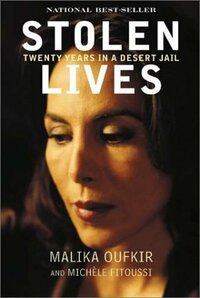Take a photo of a barcode or cover
2.5 stars.
So, I really expected a little more from the book. While her story is tragic with the point of her imprisoned for 20 years, much of it in cruel conditions, I found the authors voice a little flat and honestly a tad haughty.
The story is of a woman in Morocco whose father attempted to kill the king. He was murdered and his wife and 6 kids were imprisoned. They had lived life as kings, so their lives changed dramatically. I didn't realize that Morocco was similar to the middle east in this sense.
While the story is very interesting, I skipped the middle part all about them in prison. I was disappointed in the lack of information about how her father attempted to kill the king. I think it encompassed one sentence. I would've liked more political information. The author alluded to the fact of corruption in the government, but left it at that.
Wasn't the worst book, but I'd recommend something else over this. I've read similar books that I found better.
So, I really expected a little more from the book. While her story is tragic with the point of her imprisoned for 20 years, much of it in cruel conditions, I found the authors voice a little flat and honestly a tad haughty.
The story is of a woman in Morocco whose father attempted to kill the king. He was murdered and his wife and 6 kids were imprisoned. They had lived life as kings, so their lives changed dramatically. I didn't realize that Morocco was similar to the middle east in this sense.
While the story is very interesting, I skipped the middle part all about them in prison. I was disappointed in the lack of information about how her father attempted to kill the king. I think it encompassed one sentence. I would've liked more political information. The author alluded to the fact of corruption in the government, but left it at that.
Wasn't the worst book, but I'd recommend something else over this. I've read similar books that I found better.
This is the type of book that you can recommend to anyone, no matter where they come from, what background they have, and what their political views are! Great book; I wouldn’t say an “impressive” story, because that word wouldn’t suffice it! It’s much more than that!
P. S. Hats off to the translator Michele Khouri ميشيل خوري
If you were to read this book in Arabic, make sure to pick the one translated by him!
P. S. Hats off to the translator Michele Khouri ميشيل خوري
If you were to read this book in Arabic, make sure to pick the one translated by him!
جميلة بحق هذه الرواية ..
استطعت من خلالها فهم قليل القليل من معنى الظلم
عندما تعاقب غلى ذنب لم تقترفه..ولم يكن لك فيه يد.
والمصيبة العظمى!! أن من عاقبك كان من أحب أحب الناس إلى قلبك..
وتربطك به علاقة وطيدة كانت مليئة بالفرح والسرور
ولكنة يتحول في ليلة وضحاها إلى وحش لايعرف معنى الرحمة والشفقة
..
عندما تذهب عشرون عاماً من عمرك في غياهب السجون وفي ظلماتها
جائعاً مريضاً خائفاً
تمر عليك ليالٍ قارسة البرودة وأخرى شديدة الحرارة..عندما يبتعد عنك أصدقائك وأحبائك..ويخشون حتى من أن يلفظوا اسمك!!
عندما يتشكل الظلم في أبشع صورة
تخرج لنا مثل عذه الرواية
..
كان اسلوب الطرح مشوقاً وجميلاً تسارعت أنفاسي في مواضع وحبستها في أخرى
كما انهمرت دموعي كلما اشتد بهم الكرب وخيّل لي أنني أعيش معهم وأتجر ألماً مثل ألمهم
..
أنصح بقرائتها وبشدة
استطعت من خلالها فهم قليل القليل من معنى الظلم
عندما تعاقب غلى ذنب لم تقترفه..ولم يكن لك فيه يد.
والمصيبة العظمى!! أن من عاقبك كان من أحب أحب الناس إلى قلبك..
وتربطك به علاقة وطيدة كانت مليئة بالفرح والسرور
ولكنة يتحول في ليلة وضحاها إلى وحش لايعرف معنى الرحمة والشفقة
..
عندما تذهب عشرون عاماً من عمرك في غياهب السجون وفي ظلماتها
جائعاً مريضاً خائفاً
تمر عليك ليالٍ قارسة البرودة وأخرى شديدة الحرارة..عندما يبتعد عنك أصدقائك وأحبائك..ويخشون حتى من أن يلفظوا اسمك!!
عندما يتشكل الظلم في أبشع صورة
تخرج لنا مثل عذه الرواية
..
كان اسلوب الطرح مشوقاً وجميلاً تسارعت أنفاسي في مواضع وحبستها في أخرى
كما انهمرت دموعي كلما اشتد بهم الكرب وخيّل لي أنني أعيش معهم وأتجر ألماً مثل ألمهم
..
أنصح بقرائتها وبشدة
dark
emotional
hopeful
sad
This was not the most enjoyable book just due to the topic and the suffering that you have to bear witness to throughout the whole story but the element of the human instinct for survival is inspiring. It's a story or triumph and a really good reminder to enjoy your freedom in all of it's forms because it is not guaranteed to all people.
Malika Oufkir and her family are victims of political retribution in Morocco and imprisoned for almost 20 years, either by house arrest or in the Moroccan desert. Only after their failed escape attempt was political pressure brought to bear on the King of Morocco to free this family.
This story is gripping not only because of the story of the horrendous suppression of human rights (the youngest family member was only 3 at the time they were taken, and in his 20s by the time he met any people other than his prisoners or immediate family), but because of the story of this woman's childhood at the King's palace.
Details of life in the Harem, at the palace, at the homes of the powerful political and military people of the day are fascinating to a westerner like me!
This story is gripping not only because of the story of the horrendous suppression of human rights (the youngest family member was only 3 at the time they were taken, and in his 20s by the time he met any people other than his prisoners or immediate family), but because of the story of this woman's childhood at the King's palace.
Details of life in the Harem, at the palace, at the homes of the powerful political and military people of the day are fascinating to a westerner like me!
This is a fabulous book but ultimately a hard read. Only because it's a true story and you realize how evil can be. When I read this, it made me realize how materialistic one can become and I (hope!) have changed.
More reviews available at my blog, Beauty and the Bookworm.
Wow. What a story. Stolen Lives was my pick for "A book from Oprah's Book Club" for my 2016 reading challenge, and it was amazing. It's the story of Malika Oufkir, the daughter of a Moroccan general who was close with the king--until he tried to assassinate the king, and was executed in turn. Malika, her mother, and her siblings were placed under house arrest and eventually locked away in a desert jail for over a decade. All together, they spent twenty years imprisoned for something they hadn't done. What makes the story even more astounding is that Malika had been adopted by the previous king and raised alongside his daughter, and has fond memories of living in the palace with King Hassan II (the one her father tried to assassinate and who ordered her family imprisoned), though she did always miss her family and the freedom of life outside the palace.
The story is a very simplistic style, which I think is explained somewhat in the prologue. Malika wrote the book with her friend Michele Fitoussi, who she met in Paris. Fitoussi explains in the prologue that they recorded Malika telling the story of her life, and Fitoussi did the writing based off that. The writing style definitely sounds like the oral recitation of a story, so I think that Fitoussi probably did a good job there--and that the person who translated it into English (I don't recall the name and it's not on the cover, I'm sorry) did a good job of bringing that style over into another language. The simplicity helps highlight the immense changes Malika's life went through, without playing anything up. In fact, the years of her family's imprisonment actually come across as less severe than I'm sure they were. While she certainly relates the many difficulties they faced--the rats, the starvation, the separation--it wasn't until she began relating the many physical and mental health problems that plagued the family even after they were released that I truly began to realize the severity of their plight.
One thing that I wish had been highlighted a bit more was Malika's life after her family was released. She talks about how they still weren't truly welcome in Morocco, despite the support many people expressed for them; no one wanted to be so open about their support that they risked difficulty with the government. But Malika never actually relates anything past meeting her husband, and I would have liked to know some about how she actually came to leave Morocco and go to France, as she mentions towards the end that the family wasn't allowed to leave.
I had never known that the political situation in Morocco was so fraught, and that the problem of the "disappeared" had been such a large one. I knew about this issue in other countries around the same time period (in various places in South America, particularly) but not about Morocco! This book was enlightening, heartbreaking, and uplifting all at the same time. It's a wonderful autobiography (I think it definitely falls into this category) that tells a story that I don't think many people (thankfully) have to offer, and it is definitely a change from the comedian-authored autobiographies I've read recently. This is the compelling material that I think a good autobiography truly demands, and it makes the trials of the rich and famous really pale in comparison.
4 stars out of 5.
Wow. What a story. Stolen Lives was my pick for "A book from Oprah's Book Club" for my 2016 reading challenge, and it was amazing. It's the story of Malika Oufkir, the daughter of a Moroccan general who was close with the king--until he tried to assassinate the king, and was executed in turn. Malika, her mother, and her siblings were placed under house arrest and eventually locked away in a desert jail for over a decade. All together, they spent twenty years imprisoned for something they hadn't done. What makes the story even more astounding is that Malika had been adopted by the previous king and raised alongside his daughter, and has fond memories of living in the palace with King Hassan II (the one her father tried to assassinate and who ordered her family imprisoned), though she did always miss her family and the freedom of life outside the palace.
The story is a very simplistic style, which I think is explained somewhat in the prologue. Malika wrote the book with her friend Michele Fitoussi, who she met in Paris. Fitoussi explains in the prologue that they recorded Malika telling the story of her life, and Fitoussi did the writing based off that. The writing style definitely sounds like the oral recitation of a story, so I think that Fitoussi probably did a good job there--and that the person who translated it into English (I don't recall the name and it's not on the cover, I'm sorry) did a good job of bringing that style over into another language. The simplicity helps highlight the immense changes Malika's life went through, without playing anything up. In fact, the years of her family's imprisonment actually come across as less severe than I'm sure they were. While she certainly relates the many difficulties they faced--the rats, the starvation, the separation--it wasn't until she began relating the many physical and mental health problems that plagued the family even after they were released that I truly began to realize the severity of their plight.
One thing that I wish had been highlighted a bit more was Malika's life after her family was released. She talks about how they still weren't truly welcome in Morocco, despite the support many people expressed for them; no one wanted to be so open about their support that they risked difficulty with the government. But Malika never actually relates anything past meeting her husband, and I would have liked to know some about how she actually came to leave Morocco and go to France, as she mentions towards the end that the family wasn't allowed to leave.
I had never known that the political situation in Morocco was so fraught, and that the problem of the "disappeared" had been such a large one. I knew about this issue in other countries around the same time period (in various places in South America, particularly) but not about Morocco! This book was enlightening, heartbreaking, and uplifting all at the same time. It's a wonderful autobiography (I think it definitely falls into this category) that tells a story that I don't think many people (thankfully) have to offer, and it is definitely a change from the comedian-authored autobiographies I've read recently. This is the compelling material that I think a good autobiography truly demands, and it makes the trials of the rich and famous really pale in comparison.
4 stars out of 5.
This memoir of a family imprisoned for the crime of their father is an interesting look at the psychological toll of captivity. To be fair, I read this in translation (from the French), which might have affected the tone, but I found something insincere in Malika's story. Several chapters are just lists of complaints, which are certainly justified, but not particular interesting to read. Malika portrays her family as victims, though her father attempted to assassinate the king of Morocco, and it's hard to believe that his wife and/or adult children had absolutely no involvement in his political aspirations. Malika also characterizes herself as the family's savior, saying "I looked after them, I brought them up, I tried to keep their spirits up, I was their big sister, their mother, father, confidante, their guide and support. It came naturally to me." That passage, and other bragging throughout the book, made me suspicious of the rest of the narrative. It's difficult to believe that anyone could remain saintly throughout twenty years of prison, and the fact that Malika claims perfection casts doubt on the passages that insist she had no political designs as a young adult.




